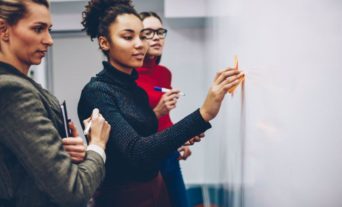Over the last year there has been increased focus on racism in society, in particular with the killing of George Floyd in the USA and the Black Lives Matter movement. This came at the same time as a recognition that people from some Black, Asian and minority ethnic (BAME) groups were at much higher risk from coronavirus disease (COVID-19) than white groups. These two things have caused a concentration across society as a whole on racism and, in medical arenas in particular, on its impacts on health.
At the College Trustee Board, we have been conscious for some time that the composition of Trustees (all white), although largely elected by College Fellows, does not reflect the broad diversity of College membership.
Diversity in the healthcare setting can refer to a number of characteristics, such as race, ethnicity, gender, sexual orientation, religion, physical abilities and disabilities, to name just a few. Additional features, including socioeconomic background, education, language, culture, age, seniority and geographical location, can introduce further points of difference but the list can of course be wider.
Diversity brings immense value – and diversity of thought is important to facilitate proper scrutiny of decision-making and ensure the College is serving all its members.
Trustees and the senior management team agreed that this is an important area for further action and improvement. We do need to understand why people want to get involved at the College and ask the question – how inclusive are we?
The response to the call for volunteers to join this new group was extremely positive and I am proud to chair such an enthusiastic group of members, who all want to help shape a better College.
The Diversity and Inclusion Advisory Group
The Trustees have now commissioned a Diversity and Inclusion Advisory Group to discuss these key issues and to advise the Board on what steps need to be taken. I have volunteered to lead this group and am keen to see the College become a fair, inclusive, open, honest and representative organisation that welcomes you and allows you to participate and succeed, no matter what your background or identity.
The response to the call for volunteers to join this new group was extremely positive and I am proud to chair such an enthusiastic group of members, who all want to help shape a better College. We have College members and College staff involved, trainees from foundation, specialty training and Medical Training Initiative, consultants, medics and clinical scientists, members from devolved nations, part-time and full-time workers, and academics, from teaching hospitals, from district general hospitals and from outside the NHS.
The invitation to participate was shared and promoted by colleagues at the British Association of Physicians of Indian Origin (BAPIO), The Association of LGBTQ+ Doctors and Dentists (GLADD) and the Disabled Doctors Network (DDN).
The advisory group membership is formed of people representing a huge range of characteristics, experience and expertise (26 in total at the time of writing), as highlighted in the table below.
| Diversity/experience/expertise | Number of members (n = 26) |
| BAME/ethnicity | 16 |
| Gender | 9 |
| LGBTQ+ | 4 |
| Disability | 4 |
| Religion | 2 |
| Socioeconomic status | 2 |
| Devolved nations | 4 |
| Less than full time (LFT) | 3 |
| Marginalised groups | 1 |
| Returning to work | 1 |
| Clinical scientist | 2 |
| Medical | 20 |
| Academia | 2 |
| College staff | 6 |
The group met first on 22 October 2020 to agree terms of reference and the broad areas on which to report to the Trustees. These include:
- the diversity of College committees, Council and Trustee Board
- how inclusive the College is for members and staff of diverse backgrounds and identities
- what steps can be taken to improve equality, diversity and inclusion at the College
- a remit to cover all functions of the College for members and staff
- providing advice on matters of diversity that impact on pathology practice
- exploring opportunities to establish relationships between the College and networks or organisations that can help the College improve diversity and inclusion.
We had an open discussion about diversity and inclusion, with some important themes emerging that will form the basis of more in-depth discussion at future meetings. These included:
- covering the need to widen participation
- supporting people to better understand how the College works and to get involved
- reviewing how inclusive the College appears on the website
- how to empower people
- mentoring
- increasing the transparency of appointments processes
- use of technology to overcome the London-centric view
- making our diversity visible
- opening doors
- challenging traditional assumptions
- having diverse role models.
Learning at work
I ran a lunchtime session with Sharonne Baiden, the College's HR Manager, for College staff on diversity and inclusion during the Learning at Work week held in October 2020. This included a training video followed by a frank and interactive discussion that provided extremely valuable ideas and perspectives on diversity and inclusion at the College. The experience of some of the participants present, who had either encountered discrimination themselves or had witnessed examples of this behaviour, clearly underlines the need for further action.
The need for demographic data
Understanding the data about members is vital to ensure that the College can be truly representative of its members. And here we hit a roadblock (temporary, I hope). In light of the General Data Protection Regulations (GDPR) that came from the Data Protection Act 2018, there was, rightly, a detailed look at the personal information held by organisations, and at the need to hold such data.
As a result, an environment has been cultured where we appear to have become scared of asking for or holding information about anyone. At the College we do not actually hold information about aspects of diversity. This means I do not know the proportion of members who are BAME or LGBTQ+, for example, and so I cannot tell you or ensure that our committees, Council and Trustees are representative of those groups of members.
At a Royal Society of Medicine webinar on LGBTQ+ healthcare I attended, a speaker said: ‘If you don’t count me, I don’t count.’ If we don’t understand our data on diversity, how can we be inclusive, provide equitable services and represent our members?
This is one of the topics that the Diversity and Inclusion Advisory Group considered and felt to be important. As a result, it is likely that the College will be asking for more information about you in the online workforce census when you log in to the College website. Sharing such data is voluntary, but I hope you can see the benefits of doing so, in order that we can better ensure we represent all of you, while providing reassurance of GDPR compliance.
I think we need to achieve a change in culture in the College with more open conversations about issues such as race, gender, sexuality, disability, socioeconomic status, opportunity and other aspects that may cause members to feel excluded.
Pathology practice
There are aspects of the practice of pathology where culture, race, gender and other identities may impact how we work. We need to be aware of specific diseases that present in certain groups and may have to adjust treatment regimens or diagnostic ranges according to patient demographics. We also need to be sensitive in the language we use. The Advisory Group will be looking at some of these and specialty guidance may follow.
We need to accept there is a problem so we can work towards solutions and aim for an environment where all members feel included and supported, no matter what their background or identity.
Moving forwards
So what do we need? I think we need to achieve a change in culture in the College with more open conversations about issues such as race, gender, sexuality, disability, socioeconomic status, opportunity and other aspects that may cause members to feel excluded. We need to work towards more appropriate representation of our diverse community across College activities.
We will share experiences and expertise from other professional organisations to better understand our current position and decide on the best steps towards change.
We need to accept there is a problem so we can work towards solutions and aim for an environment where all members feel included and supported, no matter what their background or identity. Above all we need to embed the change so it becomes continuous and not simply a topical reaction to events.
Unconscious bias
I’ll leave you to consider this. We all have biases that we bring to any situation. Unconscious bias is the product of our upbringing and the society we live in, and it means we automatically respond in certain ways without thinking.
Imagine for a moment: you’re late to catch a flight, you rush through the terminal and just make the gate, and as you climb into the plane, the pilot steps out of the cockpit and says, ‘Hi’.
When you get to your destination, you go to a local restaurant and have the most wonderful meal. A couple at the next table are celebrating their anniversary.
The next morning you attend the world’s biggest technology conference and the CEO of the hottest new tech start-up takes to the stage.
Now, think back – what did you see as you imagined the above scenarios? Was the pilot black? Was the couple in the restaurant two men? Was the tech company CEO a woman? (with credit to Valerie Alexander TEDxPasadena, ‘How to outsmart your own unconscious bias’, via YouTube).
We need to be aware of our own unconscious bias so that we can stop ourselves having these automatic responses, which may not always be helpful and may cause unintended harm and discrimination.
I would greatly welcome views and further suggestions from members around the proposed activities of the College Diversity and Inclusion Advisory Group. Please drop me an email at [email protected]




